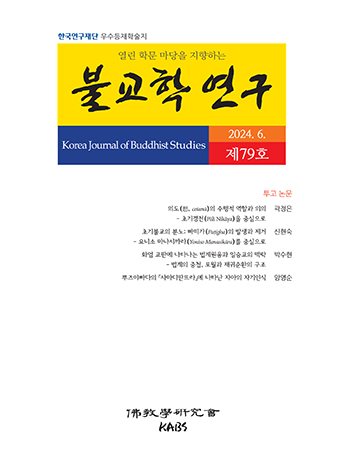Abstract
References
Sorry, not available.
Click the PDF button.
Information
It is important for yogācāra school in Ch'eng Wei-Shih Lun(成唯識論) to make all sentient beings cease to adhere to Atman and Dharmas and realize the emptiness(空) of them. To do this, they take a particular philosophical strategy. They first examine the relation between the name and the designated, and then conclude that all the words such as Atman and Dharma are metaphorical expressions(假說, upacāra) which designate seeming entities without reality.The term upacāra plays a decisive role in refuting the belief in the Atman and the Dharma which we think of as external objects(外境) apart from our mind. Yogācāra logicians hold that a word designates only a similarity or the universal and that what is associated with a word is not external object but fictitious construction produced by consciousness. The fire-man(火人) metaphor in Ch'eng Wei-Shih Lun shows what the realist, like vaiśeṣika(勝論), objects to. The objection is as follows: we must perceive the similarity between two things to understand metaphor. And this means that there must exist the real original imitated by the similar.The starting point of metaphor is the transformation that the consciousness manifests itself like something(轉似), that is, the mental phenomenon that various images of the fictitious additions appear. Thus, to understand metaphor is to hit upon an image in mind by a name. The image, exactly the meaning of a word, results from the capacity of our abstracting and conceptualizing those particular entities we perceive. And in explanation of how a word can has its own meaning, they recall us to the procedure of learning language. To learn a word means that basically we come to be aware of what other's voice is associated with. We take a specific voice as a word of meaning when we can find that the specific voice designates a similarity among a group of events we have experienced. Therefore, to learn language is to learn how to associate a word with a general image or a similarity, that is, to learn the linguistic practice of the society found in other's voice. Like this, Yogācāra logicians try to show that it is possible to understand the meaning of the word, exactly metaphor(upacāra), only by depending on the transformation of consciousness. In this procedure, many seeming entities of which the reality we believe in because of our ignorance of the nature of language or the instruction of a false religion, are excluded from the realm of the reality. As long as anything is the object designated by words, it is a similarity or a seeming entity, exactly fictitious constructions produced by consciousness. Therefore, they conclude that anything designated by name is mere consciousness and not an external object.
Click the PDF button.
- Publisher :Korean Association of Buddhist Studies
- Publisher(Ko) :불교학연구회
- Journal Title :Korea Journal of Buddhist Studies
- Journal Title(Ko) :불교학연구
- Volume : 11
- No :0
- Pages :59~85


 Korea Journal of Buddhist Studies
Korea Journal of Buddhist Studies






